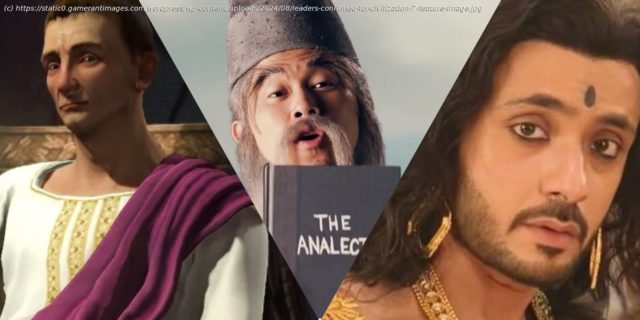These iconic historical leaders has been confirmed to be present in Civilization 7.
Gamescom 2024 revealed a lot of interesting information about the latest installment of Sid Meier’s Civilization. This included a few interesting twists to the formula, like how leaders can now be mixed and matched with different civilizations, allowing for wackier combinations. There is also an effort to focus on developing three distinct eras: antiquity, exploration, and modernity, with the player changing their civilization at each point (reflecting the significant changes that inevitably happen to any civilization given enough time). They even revealed a curious decision to expand the range of „leaders“ to not only include heads of state, but also influential figures of each civilization. But there is one question that is still pressing on the minds of fans: what leaders will be featured in the game?
The Civilization games have always been structured around players picking a civilization and playing as a real historical leader. Although there have been some consistent patterns, like Abraham Lincoln and Mahatma Gandhi, the series has enjoyed introducing players to less obvious choices. Civilization 6 included leaders from around the world of different genders and ethnicities, and it is fair to assume 7 will have a similarly wide range. While the developers have not offered a lot of detail, the information they have provided has made it possible to identify a few names.9 Agustus Caesar
Augustus Caesar was the adopted son of Julius Caesar, and grew up during the strenuous period when Rome was transitioning from a Republic to an Empire. The assassination of Julius proved to be the tipping point, as it created a power vaccuum that caused a Civil War. Ultimately, Augustus proved the better tactician. One by one, he defeated his political enemies until there was no one left to challenge him. He would then complete his rise to power by slowly taking over Rome’s major political institutions until he was effectively a king in all but name. Much of his reign would involve picking up the pieces left over from the previous wars and rebuilding Rome into a more powerful force, with reforms that would become the foundation of the Roman Empire.
Although not his first Civilization appearance (having previously appeared in 5), Augustus is an unusual choice for the series. Many of the games have gravitated towards either Julius Caesar or Trajan. This is probably because Rome was infamous for its range of unhinged emperors who would would definitely not fit the series, and both are often seen as some of Rome’s more level-headed leaders. Of course, while Augustus was by no means „good“, he certainly made a significant impact on Roman history, making him a fitting choice for Rome.8 Amina
Unfortunately, there is not enough information to paint a perfectly reliable picture of Amina, the warrior queen of Zassu (located in what is now Nigeria). A lot of her life has been subject to mythologization, which makes it hard to piece fact from fiction. What is known is she probably lived around the 15th century, and when she became queen, spent the next 34 years conquering the surrounding lands. She was said to be a fierce warrior and expert tactician who rode alongside her soldiers in battle. By the end of her reign, Amina had built a powerful empire. Her military success has made her a figure of legend whose prowess is still remembered today.
Civilization 6 showed a very clear effort to include a wide range of cultures from around the world, including Africa. While the Zulu have been represented since the first game, VI introduced a few other factions, like the Congo and Mali. Now it looks like they’re further expanding the range by introducing Zassu. Amina’s introduction also continues a trend set by 6, which involved a greater effort to represent women leaders of Africa.7 Ashoka
Ashoka had a pretty extraordinary reign leading the Mauryan Empire (located in what is now India).






